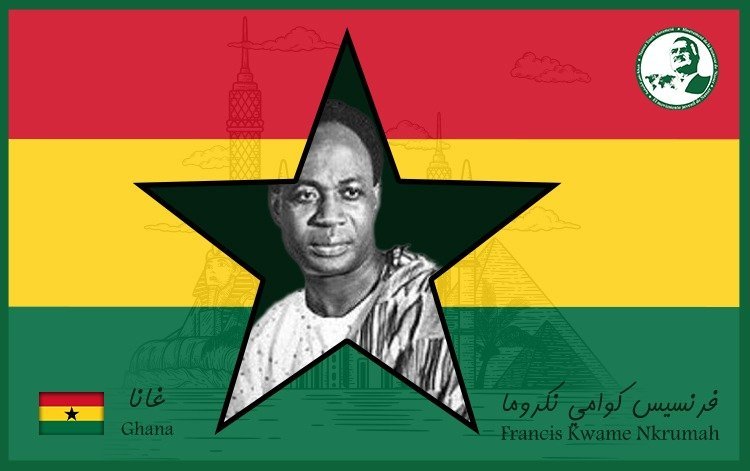Nkrumah ... the leader who loved an Egyptian woman

"Our independence will be incomplete if it is not linked to the liberation of all African countries ... The policy of colonialism since time immemorial is a policy of dividing and conquering... Colonialism is a regime which must be destroyed. The history of this continent will change as we prepare the way for the future and decide our destiny by our own will. Let's forget our enemies and make Ghana a cradle of freedom for all Africa. "
(A part of one of the speeches of the Ghanaian leader Kwame Nkrumah)
Francis Kwame Nkrumah nicknamed "Alka Mtnaku" means infallible, born September 21, 1909 in Nkroful in Ghana- Nomi tribe- and died March 27, 1972, is from a modest family, father of three children and a daughter, including three are from his Egyptian wife "Fathia Rizk" nicknamed by the Ghanaian people (Arouss el Nil), translated from Arabic Bride of the Nile. Nkrumah is known for his great intelligence and charismatic personality, though modest; possessing many other titles such as: (Esondowein: means reconciliator) and (P.G: Prison Graduate, which symbolizes his fight against colonialism).

He worked as a teacher in a primary school until 1934. Co-founder and President of the Association of African Students of the United States, he was elected Vice-President of the Union of West African Students and Secretary of the Fifth African Conference held in Manchester, then Secretary General of the Congress Party of the Gold Coast and Leader of the Liberation Movement of Ghana. In 1952, he assumed the post of Prime Minister of Ghana.
He was one of the founders of the Organization of African Unity (OAU) - the African Union today - which he chaired in 1965. He received a gold medal at the African Summit in commemoration of founders of the Organization of African Unity (OAU). It should be noted that he is one of the promoters of African Unity, he called for the convening of the Accra Conference in 1958 and he was the cornerstone of African unity. In 1961, he launched the idea of creating the Union of African States, but African countries preferred the version of the Organization of African Unity.
It should be noted that President Nkrumah elaborated multiple theories on individual freedom, socialism and the system of governance, summarized in three sections, namely: (the youth revolution against the older generation), (the people's revolution against the local rulers who obtained the authority by means of feudalism), and (the national revolution against colonialism); and among his most striking slogans are: (We must strive first to attain political sovereignty, then all will be realized), (We prefer the risks of freedom over the stability of slavery) and (Releasing Africa from the constraints of foreign governance is the only guarantee of independence).
He has also written several books, including: The African Encyclopedia of the Rewriting of African History, I speak of Freedom for the Defenders of Unity, Self-Awareness and a biography entitled Ghana.
Nkrumah and the Egyptian leader Gamal Abdel Nasser have established a solid friendship. The Egyptian president mediated between Nkrumah and Egyptian Fathia Rizk to marry and managed to persuade her mother of the marriage, assuring her that he would open an Egyptian embassy in Ghana and provide her with a direct flight between Egypt and Ghana to visit her daughter at any time.
Nkrumah married Fathia by offering her a diamond ring costing 100 British pounds and 500 British pounds and the marriage was concluded on New Year's Eve (1957/1958). It should be noted that Nasser was informed of the date of the wedding ceremony, while Ghanaians of all levels did not know the date until several hours after the wedding. The eldest son was named Gamal in honor of the Egyptian leader and friend who had always received Nkrumah during his visit to Cairo with his family, as if Nasser was his father-in-law. During her visit to Cairo, Nkrumah's wife briefed the Egyptian president on Israeli activities in Ghana, which prompted the Israeli ambassador to develop a pessimistic view of her marriage to Nkrumah. Egypt also welcomed Nkrumah's family after the 1966 coup d’Etat, a plane was sent to them and they were received at the Tahra Palace for a period of three months, and then they settled in Maadi. Nkrumah received the Order of the Republic (Egypt) and an honorary doctorate from Cairo University in 1958.

